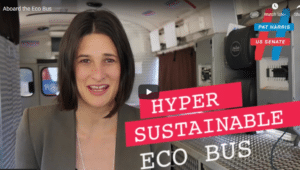“Why Your Moral Compass Is More Important Than Your Career Path”
I’ve got a sneaking suspicion that most folks don’t have a long term career plan for themselves.
Today, I’m here to tell you, that’s okay.
The truth is, your perfect job simply might not yet exist. Maybe the career you want is being built by you, instead of being presented to you.
If that’s true (and go with me here, let’s assume it’s true), that doesn’t make your passion and lived experience any less valuable. In fact, the opposite becomes true — that by following your moral compass through a territory where maps don’t exist, you’re more accurately defined as a trailblazer, and not merely an astray professional.
But, for those trailblazers, it can be really, really hard to understand at the time that you’re on any path at all.
These folks might have had some professional wins, or jobs they’ve loved, or a niche they’ve developed for themselves, or a network of people who associate them with a particular skillset or industry. Perhaps as they’ve gotten older, and the more invested they’ve become in that affiliation, the more related professional opportunities have accordingly presented themselves.
But along the way, they might be asking:
“Is this my true potential?”
“Am I in my dream career?”
“Is this the line of work I envision doing for the rest of my life?”
“Did I ever have a clear vision for my life? Or is it merely where I found myself after years of working?”
“If I could start over and truly dedicate myself to one professional path — do I even know what that would be?”
I personally find this to be a depressing line of questioning. But, I’ve also found that, the more open I am about my own perpetual career soul-searching, the more I find others experiencing similar professional-as-existential-predicaments. During deeply private and vulnerable conversations I have with myself, or perhaps with a trusted friend or therapist, I observe that these feelings lay, “behind the veil,” most of the time, because for today’s strong professionals there seemingly isn’t room for anything less than supreme confidence — not without fear of looking professionally aimless, anyways.
When I first started (what has become) my career, the idea of being a professional environmentalist didn’t seem obvious to me. This field was much more limited, and I didn’t know how my assortment of skills and interests would fit into a particular role. Fortunately, in the past decade, this market has exponentially grown, creating more professional opportunities for creative and environmental leadership, and voices like mine.
As I enter the middle of my 30’s, the above situation is roughly where I’ve found myself. I’m both ambitious and accomplished — yet also feeling like I’m perpetually professionally wandering.
Looking back, this phenomenon has been an important throughline in my professional life.
I graduated high school early, then moved to California on my own and started college at 17, yet it took me 7 years to finally get my degree. I considered majors ranging from journalism, to filmmaking, to music, to nutrition, to geography, and finally I proudly graduated from UCLA with a BA in Cultural Anthropology and a minor in Environmental Systems and Societies. Then, with my diploma in hand, I stepped immediately into an economy still reeling from the wake of the Great Recession, and like millions of others, I struggled to find consistent work in my field.
Who knew — turns out a BA in Anthropology doesn’t perfectly set you up for consistent, recession-proof employment.
Sure, on a project basis, I was doing fine. I worked with prolific environmental artist Spectral Q, and travelled around the world organizing large scale installations and events, well before I graduated from UCLA. And sure, this work received international acclaim, so I felt confident that I was making a meaningful impact working with incredible talent.
But in between projects, I quickly spiraled into ennui, and constantly asked myself, in my quiet moments, “What am I doing with my career? Where is this all leading me? What’s my plan?”
In trying to answer that question, I worked with farmers, joined the Conscious Goods Alliance national tour, led environmental outreach and influencer campaigns, and was employed by everyone from an archeologist to a global consulting firm. I met the man who later became my husband while I was campaign manager for a U.S. Senate candidate. During that time, I was also a recording artist, a neighborhood council member, board member, and even won some awards. Somewhere in there I launched a social good company.
But have those things added up to, “a career?”
I’ve definitely never had a roadmap, so I’ve typically not known how one step would lead to the next. Instead, I’ve learned to accept my constant internal questioning of myself as part of my reality. It always has been, after all.
Does this mean I’m professionally lost, or hopeless? I vehemently think not. And yet, in my professional life I’ve not only felt a need to explain myself over and over, but also to have a concrete answer to the inevitable question, “So what do you do?”
It’s always been easier for me to hedge and answer something like, “Well, this is what I’m doing right now…” while explaining whatever was my current project at the time. While I would be telling the truth, I’d also leave out how being confronted with this question led to feeling significant anxiety.
In the same way that it’s not glamorous to admit that you experience loneliness, there’s often a stigma around the experience of not having a master plan for your career.
Today I’m telling you: that stigma is unhealthy to everyone of us out there doing epic work even while we’re not knowing everything that lay ahead.
Having a five or ten year plan for your life is basically impossible for most people. I used to think it was a phenomenon only experienced by younger professionals — and especially of creatives — but now I see that this struggle permeating through most ages and professions.
It’s not only okay to not have a master plan, but with all the instability in this world, it’s also totally reasonable.
Now, in our era of pandemic culture, fluctuating economies, massive debts, social injustices, and climate change, it’s completely understandable that humans are having trouble predicting long term systems, and accordingly having trouble embarking upon long term careers. And, I’ve come to the conclusion that planning a long term career isn’t necessary, either. You can be very successful, while taking an unorthodox and fluid approach to your professional journey because the career you want is being built by you, instead of being presented to you.
It’s infinitely more important to have a moral compass to guide you along your windy road. I’m referring to a set of principles, values, and issues that compel you, which spark meaning in your life.
For most of us, this evolves as we grow. Because industries and issues are ultimately always intersectional, the skillsets from one seemingly-unrelated role can become instrumental for succeeding in others.
For example, if I hadn’t learned project management from working with the artist Spectral Q, I wouldn’t have had the necessary skills to lead a US Senate campaign.
Even outside of skills, and on a purely philosophical level, my time on the campaign then taught me to appreciate the causation between fossil fuel companies donating to political campaigns, and those same politicians in turn backing a Big Oil agenda — making campaign finance reform a top issue for me.
The truth is, because your perfect job might not actually exist yet, “learning on the job,” might involve many, many jobs.
Amidst all this uncertainty, one’s moral compass must serve as their north star. It can ensure that you have the feeling of consistency of staying true to your values, even if you’re still exploring your professional trajectory. By doing this, you’re not dependent on a job, or a boss, or a company to feel a sense of meaning and passion in your life’s work, whatever it may be. Instead, your sense of meaning can inform what are your best career moves.
I’ve spent a long time cobbling together my own version of this. I took on roles that taught me skillsets which I could then apply to my larger passion of environmental advocacy. Learning how to produce events, manage campaigns, speak publicly, facilitate dialogues — all these learned skills came from different professional roles. Over the span of my career, I’ve largely applied them in service to our people and planet, which is my moral compass. Even during my stint at the management consulting firm, which had nothing to do with the environment, I knew that if I could learn how to navigate executives and corporate settings, effectively run meetings and have strong digital competency, I could bring this skillset back into the environmental space and use my newfound powers for good.
So the next time you’re being hard on yourself for not having a stronger direction — give yourself a break.
You’re planting a tree whose shade you’re not yet under.
Focus on what really matters to you — what you want to see more of in the world, what you actually enjoy doing — and know that the path you’re on is likely leading you in the right direction already.
Compasses point north, after all. When you know nothing else, you can still know, “that’s north.”
The more we’re in tune with our authentic and passionate selves, the more professionally empowered we can become to take on each phase of our lives with strength and vitality, and to bring about goodness in the world.
I, Too, Don’t Know What I’m Doing With My Career
The Solution’s in the Soil: Food for Thought
South Central Farm Restoration Committee Rallies to #BuyBackTheFarm
Have You Been to Jail for Justice?





